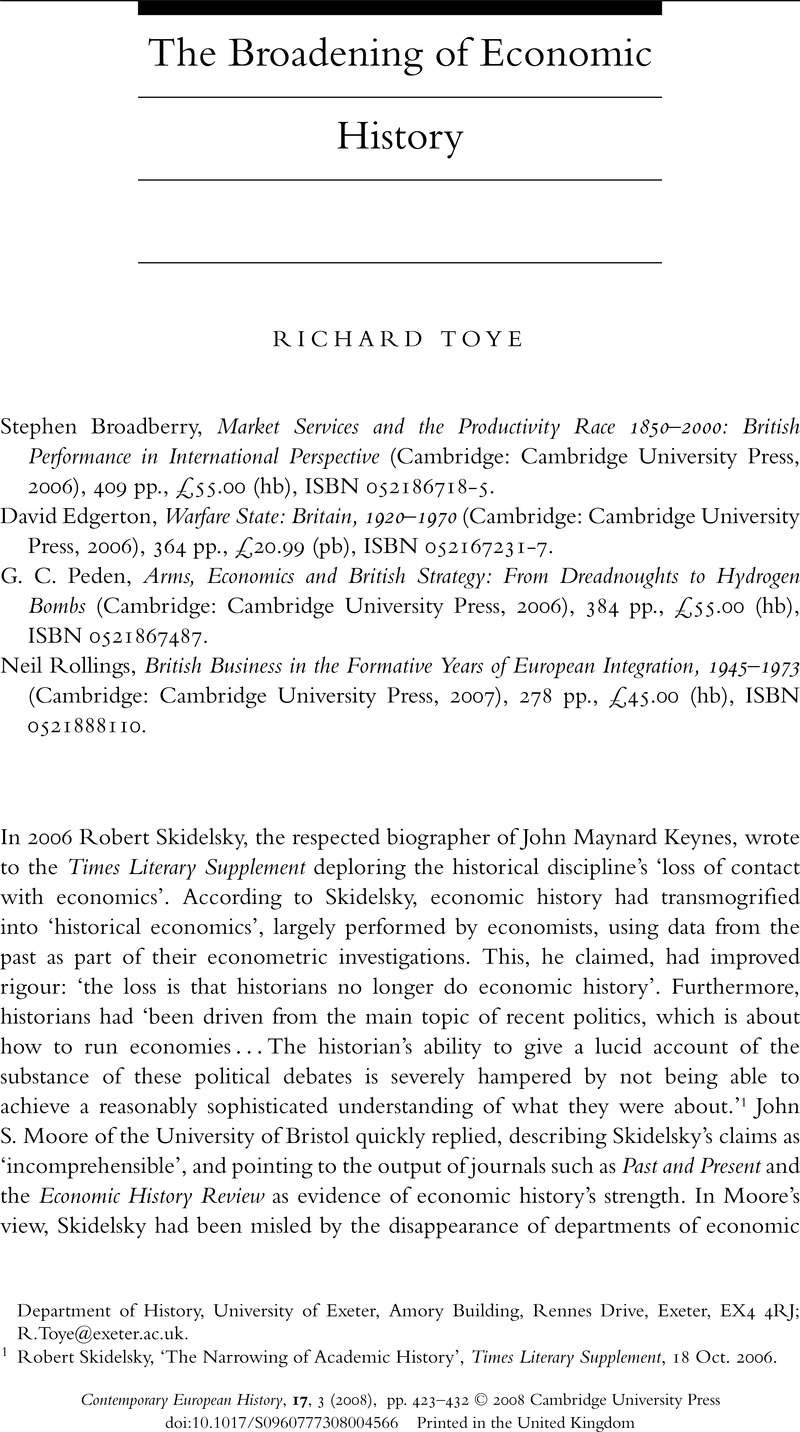No CrossRef data available.
Published online by Cambridge University Press: 01 August 2008

1 Robert, Skidelsky, ‘The Narrowing of Academic History’, Times Literary Supplement, 18 Oct. 2006Google Scholar.
2 Moore, John. S., ‘The Narrowing of Academic History’, Times Literary Supplement, 1 Nov. 2006Google Scholar.
3 For example, Supple, Barry, ‘Moral Choice and Economics: British Political Economy in the Twentieth Century’, in Green, E. H. H. and Tanner, Duncan, eds., The Strange Survival of Liberal England: Political Leaders, Moral Values, and the Reception of Economic Debate (Cambridge: Cambridge University Press, 2007), 275–306CrossRefGoogle Scholar; and Trentmann, Frank, ‘Before “Fair Trade”: Empire, Free Trade, and the Moral Economies of Food in the Modern World’, Environment and Planning D: Society and Space, 25, 6 (2007), 1079–102CrossRefGoogle Scholar.
4 A process described with great insight in Hyam, Ronald, Britain's Declining Empire: The Road to Decolonisation 1918–1968 (Cambridge: Cambridge University Press, 2007)CrossRefGoogle Scholar.
5 See, for example, O'Hara, Glen, From Dreams to Disillusionment: Economic and Social Planning in 1960s Britain (Houndmills, Basingstoke: Palgrave Macmillan, 2007)CrossRefGoogle Scholar.
6 Zimmern, Alfred, Quo Vadimus? A Public Lecture Delivered on 5 February 1934 (London: Oxford University Press, 1934, 32–42Google Scholar.
7 See Collini, Stefan, ‘Where Did It All Go Wrong? Cultural Critics and “Modernity” in Inter-war Britain’, in Green and Tanner, Strange Survival, 247–74Google Scholar.
8 Snow, C. P., The Two Cultures: And a Second Look (Cambridge: Cambridge University Press, 1964), 41–51, 79Google Scholar.
9 See Lawton, Nicholas, ‘The Cold War and the Labour Party: Political Thought and Policy c. 1959 to the 1964 General Election’, M.Phil. thesis, University of Cambridge, 2005, and Richard Toye and Nicholas Lawton, ‘“The Challenge of Co-existence”: The Labour Party, Affluence and the Cold War, 1951–64’, in Corthorn, Paul and Davis, Jonathan, The British Labour Party and the Wider World: Domestic Politics, Internationalism and Foreign Policy (London: I.B. Tauris, 2008), 145–66Google Scholar. For a perspective on how such issues played out in the US context, see Parker, Richard, John Kenneth Galbraith: His Life, His Politics, His Economics (New York: Farrar, Strauss & Giroux, 2005), ch. 14Google Scholar.
10 Here and elsewhere Edgerton could have benefited from Geiger, Till, Britain and the Economic Problem of the Cold War: The Political Economy and the Economic Impact of the British Defence Effort, 1945–1955 (Aldershot: Ashgate, 2004)Google Scholar.
11 Shonfield, Andrew, British Economic Policy Since the War (Harmondsworth: Penguin, 1958), 55–9, 90–107Google Scholar.
12 For examples see Ramsden, John, Don't Mention the War: The British and the Germans since 1890 (London: Little, Brown, 2006), 50–1Google Scholar.
13 Tooze, Adam, The Wages of Destruction: The Making and Breaking of the Nazi Economy (London: Allen Lane, 2006), xxiiGoogle Scholar.
14 Eden, Clarissa, A Memoir: From Churchill to Eden (London: Weidenfeld & Nicolson, 2007), 152Google Scholar.
15 Hodges, Andrew, ‘Turing, Alan Mathison (1912–1954)’, Oxford Dictionary of National Biography (Oxford: Oxford University Press, 2004), www.oxforddnb.com/view/article/36578 (last visited 12 March 2008)Google Scholar.
16 Somewhat in contrast to Broadberry's findings, Peter Scott and James Walker have given a positive account of the use of US efficiency techniques in the case of department stores: ‘The Determinants of Productivity and Growth for British Department Stores in the 1930s’, paper given at the Economic History Society Conference, University of Exeter, 30 March–1 April, 2007.
17 Valerie Johnson, ‘British Multinationals, Culture and Empire in the Early Twentieth Century’, Ph.D. thesis, King's College London, 2007.
18 See, for example, Manton, Kevin, ‘Playing Both Sides against the Middle: The Labour Party and the Wholesaling Industry 1919–1951’, Twentieth Century British History, 18, 3 (2007), 306–33CrossRefGoogle Scholar.
19 Morgan, Kenneth O., Michael Foot: A Life (London: HarperCollins, 2007), 274Google Scholar.
20 For an excellent recent example of the latter see Christopher Cotton, ‘The Labour Party and the 1975 Referendum on British Membership of the European Community’, M.Phil. thesis, University of Cambridge, 2006.
21 There are analogies here with the problem of the ‘claim to represent’ at the political level, described in Jon Lawrence, Speaking for the People: Party, Language and Popular Politics in England, 1867–1914 (Cambridge: Cambridge University Press, 1998).
22 See in particular Martin Daunton, ‘Britain and Globalisation since 1850: I. Creating a Global Order, 1850–1914’, Transactions of the Royal Historical Society, 16 (2006), 1–38, and ‘Britain and Globalisation since 1850: II. The Rise of Insular Capitalism, 1914–1939’, Transactions of the Royal Historical Society, 17 (2007), 1–33; and also the work of Frank Trentmann.